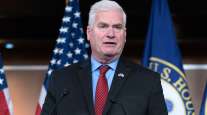Senior Reporter
House GOP Points to Transportation Record

[Stay on top of transportation news: Get TTNews in your inbox.]
An update to Federal Highway Administration guidance related to a $1.2 trillion infrastructure law is among key achievements House Republicans are touting during their first 100 days governing in the majority.
House Transportation and Infrastructure Committee Chairman Sam Graves (R-Mo.) pointed to his caucus’ push for action on FHWA’s 2021 policy memorandum, which was updated earlier this year.
The document’s update is part of the committee’s record of “fulfilling our promise to provide needed oversight of the Biden administration,” Graves explained on April 13. Specifically, he said his team “successfully convinced the Federal Highway Administration to substantially revise and replace its guidance memo that attempted to undo the flexibility provided to states in the Infrastructure Investment and Jobs Act.”
The IIJA was signed into law in November 2021. FHWA’s leadership issued a memo soon after the law was enacted suggesting state agencies prioritize the maintenance of highway projects over proceeding with new construction projects. This so-called “fix it first” approach drew pushback from Graves and other top Republicans.
The Lower Energy Costs Act will unlock American energy independence and lower costs for American families. It’s long past time we ended President Biden’s war on American energy. pic.twitter.com/afPz438zNV — Rep. Sam Graves (@RepSamGraves) March 29, 2023
FHWA eventually updated the document. On Feb. 24, the agency’s new memorandum affirmed state agencies’ active role in decision-making affairs specific to infrastructure projects.
“By issuing a revised memorandum, FHWA admitted that it was wrong in their attempts to undo the flexibility provided to states in the law by establishing preferences for certain policies and projects. We’re pleased FHWA recognized that when it comes to legislation of any kind that is passed and signed into law, an administration cannot ignore the role and will of Congress,” Graves said in a statement with Sen. Shelley Moore Capito (R-W.Va.) on Feb. 24. The senator is ranking member on the Environment and Public Works Committee.
The Feb. 24 memo, titled, “UPDATE: Policy on Using Bipartisan Infrastructure Law Resources to Build a Better America,” indicated: “States determine which of their projects shall be federally financed by federal aid highway formula dollars. Different states have different needs when it comes to transportation assets that must be reconfigured and modernized, expanded and added, or retired and replaced.”
House Republicans also highlighted passage of comprehensive energy and permitting reform legislation. Graves observed, “In just 100 days, [Transportation and Infrastructure] Republicans have led efforts to pass bills to renew our nation’s energy independence.”
The House on March 30 passed by a vote of 225-204 the Lower Energy Costs Act, or HR 1. Sponsors of the bill, which included Graves, explained it captured the Republicans’ priorities for their domestic policy agenda.
“This bill does exactly what the bill title says. It will lower energy costs for American families, farmers and businesses by removing unnecessary regulatory barriers to critical energy projects and by increasing our energy independence, all while continuing to protect our environment,” Graves said on March 30. The legislation targets domestic energy production. It also would update the permitting process for industries, reverse certain Biden administration energy-centric policies, streamline energy exports and enhance production and processing of minerals.
Going forward, the transportation committee will aim to provide careful oversight of the Biden agenda, as well as pursue meaningful authorizing policy updates. As Graves put it, “The committee continues to lay the groundwork for critical authorizations of the Federal Aviation Administration, the pipeline safety program and the U.S. Coast Guard later this year, and I look forward to ensuring that our nation has a safe and efficient transportation network that meets the economic needs of our diverse states and communities.”
Want more news? Listen to today's daily briefing below or go here for more info:




